HIT CHANNEL EXCLUSIVE INTERVIEW: May 2014. We had the great honour to talk with an amazing guitarist and composer: Manuel Göttsching. He is the leader of Ashra, Ash Ra Tempel and he has also a brilliant solo career. His latest release is the “Correlations- Live in Concert” DVD. Read below the very interesting things he told us:
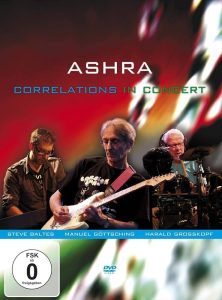 Are you satisfied with the final result of the “Correlations- Live in Concert” DVD, performed in 2012 in Berlin?
Are you satisfied with the final result of the “Correlations- Live in Concert” DVD, performed in 2012 in Berlin?
Yes, I’ m very happy with it. I’m happy about the concert. I think it’s a beautiful DVD, a beautiful document. It was a very nice evening, a very nice place and a good weather outside. There was a familiar atmosphere and there were many-many people. Also, Mick Glossop was there, the original producer. Eberhard Panne, the engineer, came from Frankfurt and many other friends. I think it’s a beautiful DVD and it has a nice cover. In the booklet of the DVD I wrote about Storm Thorgerson from HIPGNOSIS (ed: Pink Floyd, Led Zeppelin, Scorpions album covers) and dedicated the DVD-album to him as he unfortunately shortly before died.
What are your thoughts today about the “Correlations” (1979) album? It’s my favourite album of your discography.
Thank you. The “Correlations” album is different from the other ones, because I decided to make some shorter pieces, not so long and improvisational pieces but some short and concrete pieces which all had 3, 5 or 6 minutes. It was a long process and it took one year. It was the first release under the name ASHRA with the new line up: Lutz Ulbrich (guitar and keyboards), Harald Grosskopf (drums) and me. Before I had released my solo music under this name. We had already performed a lot of concerts in this line up, but we have played music from my solo works: “New Age of Earth” (1976) and “Blackouts” (1977). “Correlations” is the first studio recording.
Which are the current projects you are involved in? Are you doing any recordings at the moment?
Yeah, there are some very interesting projects. In the end of this year, there will be in Paris an exhibition which is about and around my album “E2-E4”, an album of experimental electronic music. I will play there and we have invited Joaquin Joe Claussell from New York and a famous French musician, sorry I don’t know the name at the moment. I released an album with Joe Claussell, where he did a remix for some of my older titles, see here: http://www.ashra.com/disco/4a61jo.htm . That’s why the CD is called “Joe Claussell meets Manuel Göttsching”. There wilI be 2 concerts this and next year: A quite interesting and special one in Southern France. There we will play the original music from the film “Le Berceau de Cristal” by Philippe Garell from 1975. The music was recorded in 1974 with my band Ash Ra Tempel. And we will perform it for the first time as a live concert. The film was with Nico, Anita Pallenberg and Dominique Sanda. Of course everybody knows Nico as singer of the band Velvet Underground. Ash Ra Tempel made the music for that film and will perform in September in France. Another concert will be in Holland, but this will be a solo one. And for next year we plan something very interesting: A dance show with a ballet by the very famous German choreographer Gregor Seyffert . It will be a choreography of a famous chess game from 1851 called “The Immortal Game” as a kind of dance show. There will be 32 dancers who will perform to my music from “E2-E4”. As you know “e2-e4” is the first move in the chess play :-). They will dance on a big LED chess board, while I will be playing live but also as 3D. Beside Germany we plan shows in London, New York, Moscow, Korea, may be in China, but of course also in Japan. So, that is gonna be very interesting and very funny project for the next year.
Between 1983 and 1997 you gave very few concerts. Did you get tired of playing gigs then?
I was very busy then and I didn’t tour. I was working in the studio. I made some music for theatre. I was working on the “Tropical Heat” (1991) album and I wrote music for “Walkin’ the Desert” (1990). I was just busy and I didn’t do many concerts.
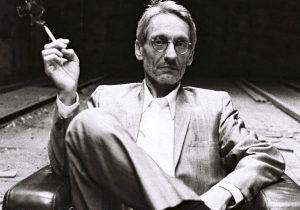 How important was the contribution of the legendary producer, Conny Plank to Ash Ra Tempel’s debut album in 1971?
How important was the contribution of the legendary producer, Conny Plank to Ash Ra Tempel’s debut album in 1971?
At that time, there weren’t many people in Germany who worked on experimental music. We had problem to record our first album. We went to different studios and we finally found Conny Plank. It was good because I wanted to keep that music as much as original like a concert, very original, without doing a lot of studio tricks and overdubs. I wanted to sound like a live album because the original line-up of Ash Ra Tempel was a very good live band. Yes, Conny was great, he liked our music and there was a very good atmosphere in the studio and we were very happy to find Conny Plank. It was our third attempt for a studio.
When you completed the recordings of the first Ash Ra Tempel album, had you realised that you have created an excellent album?
(Laughs) Yes, of course we liked it. I liked it and this was the music that we played. Ash Ra Tempel was a good live band and we had played a lot of concerts in small clubs and we tried to catch the live atmosphere. It was a great album and it’s an excellent document of that time and I like it very much.
The great Timothy Leary participated in Ash Ra Tempel’s “Seven Up” (1972) album. How was that experience?
We met Timothy Leary in ’72 and he developed the idea of The Seven Levels of Consciousness and he decided to write a book about The Seven Levels. So, we took this idea as the concept for the album and we wrote seven pieces of music. We went to Switzerland with an extended band: we had additional singers, an organ player and a large band for the project. We had a funny time there with Timothy Leary and all his entourage. We stayed in a big farm outside Bern, in the middle of Switzerland, and it was beautiful, yes.
How was Timothy Leary like as a person and as a collaborator?
He was a perfect collaborator, he had great ideas and he was a very nice guy. It was a pleasure to work with him and he was very open-minded. In the beginning, he wanted only to talk, to speak with lyrics but he was so fascinating by the music and he liked it, and he decided to sing. So, we have a document with Timothy Leary singing. Probably the only one (laughs). He was very interested in electronic sounds, he liked them very much. It was the first thing that he understood when he entered the recording studio and it was very interesting for him to do an album about his theories. Yes, I liked him. In the beginning, I maybe thought that it would be difficult to work with. He was very nice, very American. He liked the food, he liked the wine and the cars.
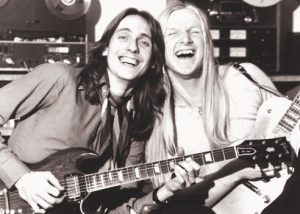 Are you proud of the classic status that your solo album “E2-E4” (recorded in December 1981, released in 1984) has?
Are you proud of the classic status that your solo album “E2-E4” (recorded in December 1981, released in 1984) has?
Yes, I’m very proud and very happy. It took a long time. I worked on this for many years to develop it. In the beginning, many critics and many people didn’t understand it: Because it has one 60-minute track and only 2 chords and maybe they found it not very interesting and too boring and not very attractive. It took some time for people to understand it and I’m very happy that over the years it becomes more and more popular. Many people have remixed its music and they have used it in clubs and in their performances. In America, Larry Levan from the famous Paradise Garage made it popular and played it in its entire length. Sueño Latino, sampled “E2-E4” on their song “Sueño Latino” in 1989. Basic Channel, a German electronic music duo released a remix of “E2-E4” in 1995. It’s experimental and minimal music that has been developed many years ago.
Why do you prefer writing instrumental music?
I don’t know. Maybe I’m not talented to write lyrics (laughs). I’m interested in music and in sounds, so I use the human voice but not the lyrics. You hear me singing in the first Ash Ra Tempel album and on “Schwingungen” I read lyrics. Timothy Leary was an exception, because of the content of the album which is based on his theory. But yes, I like instrumental artists, maybe because instrumental music is more international. I have performed in many countries all over the world and maybe it’s easier than having lyrics, especially German lyrics. If you have German lyrics, of course all your fans will be in Germany. If you have French lyrics, it would happen the same. I’m not English, so I don’t need to have English lyrics.
Do you wish the original Ash Ra Tempel line-up had lasted longer?
It’s difficult to say. Yes, we could have stayed for more, but we were very different people, very free individuals and musicians. In 2000, we came together for a short reunion and we played and recorded and performed and then everybody went into a different direction. Yes, maybe the original Ash Ra Tempel line-up would have lasted for one more year, but we did a small reunion in 2000.
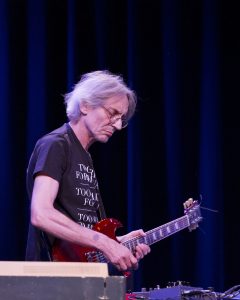 What was your first reaction when you saw the cover of “Corellations” (1979) designed by Hipgnosis?
What was your first reaction when you saw the cover of “Corellations” (1979) designed by Hipgnosis?
I wasn’t surprised because we developed this cover together. Hipgnosis proposed some ideas and then I had to choose some ideas and later they were shooting the photos. They had about 150 shots of this motif of this idea and I went to London and I had to go through all these 150 photographs and then choosing this one for the cover. So, it wasn’t their decision, it was a common decision to use this photo.
Who are your influences as a guitarist?
I like very much blues guitar players like Eric Clapton and of course Jimi Hendrix. But I also like Mick Taylor, Jeff Beck and British blues players. That’s the electric guitarists. From acoustic guitarists, I like very much Paco de Lucia. Unfortunately, he died. There are different influences and I try to experiment with the guitar. My guitar is influenced by blues music and of course I’m classical trained, I have many years of classical training and I’m interesting in classical, electric and experimental music. There is another guitar player that I like very much, who is Elliott Sharp from New York. He is from downtown New York and he is more interesting in jazz, but he’s a very interesting and very experimental guitarist. And of course, I like the English guy, Steve Hillage (Gong, System 7). I made a very good concert in 2010 in Japan. We performed at an event for electric guitar and there were four guitar players: Elliott Sharp from New York, Steve Hillage from London and a young Chinese player, Zhong Shouwang. A talented guitar player, who is very experimental. He doesn’t do guitar experiments with computers, but with old fashion equipment like echo and analog stuff. We had a nice performance at the event for electric guitar at a big festival, at the Metamorphose Festival. I play there every 5 or 6 years, I hope to release this. There is a lot of material that I have recorded and I can’t release all of them at the same time (laughs).
Would you like to work again with Klaus Schulze in the future?
No, I don’t think so. Because we are too different. It doesn’t make sense any more. I think the last show we made together was the Ash Ra Tempel reunion in London in 2000. It was interesting, it was a nice concert but I think that’s ok, it doesn’t make sense. We have different directions.
Do you think your music should have received more recognition from press?
Sometimes, yes. In the ‘70s and ‘80s. I have a lot of press during the last years. I had a big article and a cover for The Wire, I had a cover for Blow Up, an Italian magazine for the 30 years of “E2-E4”. I had many articles for the 30 years of “E2-E4”. I have very good press during the last years. It’s ok. I don’t play too often. So, I’m interested in making new projects. In Germany it’s a bit difficult, because German people they don’t like very much their own artists. They like the American artists (laughs). It’s very difficult to play your music in Germany. But I’m sure in many other countries happens the same.
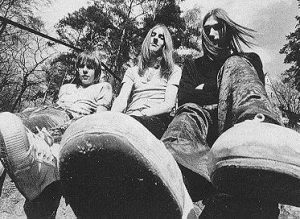 Some great German musicians from your era (Michael Karoli of Can, Klaus Dinger of NEU! and Florian Fricke of Popol Vuh), unfortunately have passed away. Did you know those guys personally? Do you like the music they created?
Some great German musicians from your era (Michael Karoli of Can, Klaus Dinger of NEU! and Florian Fricke of Popol Vuh), unfortunately have passed away. Did you know those guys personally? Do you like the music they created?
I knew some. I remember Michael Karoli. I liked Can very much. We played together in ’74, ’75 in Southern France and I went to their studio. Michael invited me to his place and I went to meet the others too. I liked him, I liked Can very much. Klaus Dinger and NEU!, I never met them and I was never very much into the music of NEU! and this kind of music. Florian Fricke, I remember him well. I liked him very much and his band Popol Vuh. He came to my place and he was very fascinated by the Timothy Leary album. He liked it very much. So, I had met Florian. I met him later again but unfortunately he died a little bit early.
Are you happy with the triumphant return of the vinyl?
Yes, of course (laughs)! Yes, I think it’s a good thing for collectors. I will re-release all my albums on vinyl. I have thought of it during the last few years, but I haven’t done it yet. I have quite many offers for vinyl re-release, but as you know I have my own label (ed: MG.ART) and of course I want to make it on own my label.
What kind of music are you listening to at the moment?
I don’t listen very much to music. I like to play music but at the moment I just moved to my own place, I have a studio and a new office and I haven’t unpacked all my stuff yet. I mostly like to play music. Occasionally, I like to play my old blues records but not something in particular.
Is there any film director you would like to work with for a soundtrack?
Yes, it’s a funny question. My wife is a film director and I would like to work with her. I have already done it. She’s my favourite (laughs). I don’t like very much to score music. I like to compose music, but I don’t have to compose films. I just make the music and when I make the music I don’t think about images. If somebody can use the music for a film, it’s fine and I’m very happy about this. For me, it’s difficult to work for a film. There is an interesting guy from New York, Jonathan Khanlian, a film director who made a film based on my music. It is called “Digital Physics” and it’s a film about a computer freak.
A huge “THANK YOU” to Manuel Göttsching for his time and to Myriam for her valuable help.
Official Ashra website: http://www.ashra.com

